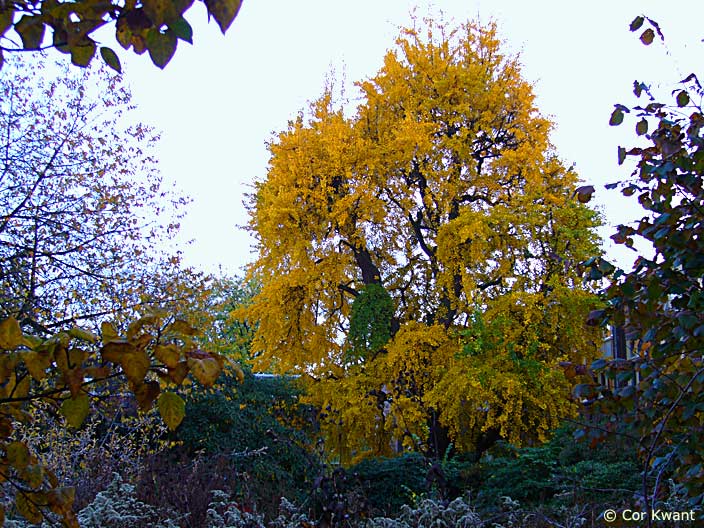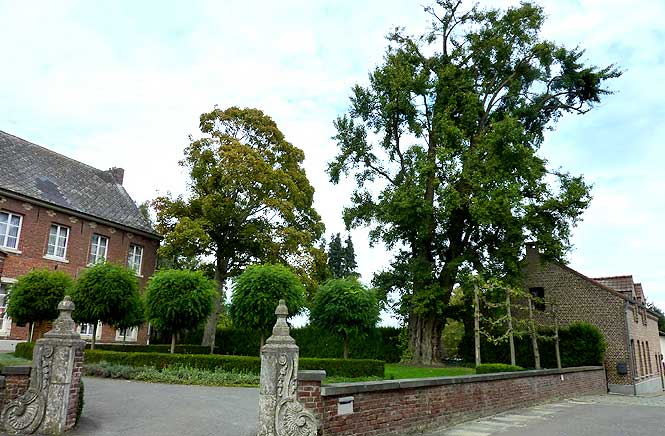|
|
Two
of the oldest Ginkgo biloba trees outside Asia are growing in Europe.
The
tree in Utrecht (the Netherlands) is seen as one of the oldest, but the
tree in Geetbets (Belgium) is thicker....
Utrecht (the Netherlands)
male, about 1730-1750
(with grafted female branch c. 1830).
Location: botanical
garden De Oude Hortus, Lange Nieuwstraat 106.
The male old Ginkgo in Oude Hortus in Utrecht (the Netherlands).
* Utrecht
has the Ginkgo seen as one of the oldest trees outside China and Japan,
planted between 1730-1767? as a young tree or grown from seed taken to
Europe by VOC-ships from the Isle of Deshima (as a result of Kaempfers
discovery of the Ginkgo). This manmade isle looks like the outline of a
Ginkgo-leaf! However Linnaeus doesn't mention this Ginkgo, although he
visited the hortus in Utrecht several times between 1735-1737. Maybe it
wasn't there or he didn't know how to classify it; this must have been
a problem for the first time he mentions a Ginkgo is in his Mantissa Plantarum
of 1771. It is also not listed in the hortus' catalogue of 1747. In 1780
prof. Nahuijs sent a complete list of all plants and trees in this hortus
to Thouin of the Jardin Royal in Paris, but again the Ginkgo is not listed.
The only prove (?) of the planttime of around 1730 is the visit of the
German botanist Ehrhart in 1787 to this hortus, for he describes this Ginkgo
to be some 4 meters tall (but that is not very tall for a 57 year old tree).
The Belgians think a Ginkgo
in the Belgian place Geetbets in the garden next to the church (near
Hasselt) is at least as old, because it is thicker (I saw this tree and
also the Ginkgo in Utrecht and I got the impression the Belgian tree has
suffered more environmental stress and traumatic events), but there is
no prove of this althought their girth differs.... Judge yourself by viewing
the pictures I made of the two probably
oldest Ginkgos outside Asia in Utrecht and Geetbets.
In 1814 a female Ginkgo was discovered in Bourdigny (near Genève) originating from a nursery in England. It took almost 100 years before it was known that the Ginkgo was dioecious. The Utrecht Ginkgo is male. Probably in c. 1830 a female branch was grafted on it at about 10 meters height. This was not discovered until 1918 when it was bearing seeds!
Girth 4.12 m (measured myself at 1,5 m from ground level in 2001).
The
leaves of the grafted female branch turn yellow (and fall later) later
than the leaves of the male tree.
You
can see this on the photo below: green leaves on the female branch , male
tree yellow leaves:

| trunk
|
In winter
|
VIDEO (play in HD):
|
|
Geetbets (Belgium)
female tree,
c. 1750. Location: 37 Dorpsstraat, next to the church.
Girth 4.96 m (in 1993 at 1,5
m from ground level). Probably taken to Belgium by missionaries (?) from
China.
Tree has been damaged by lightning
and was treated by a tree surgeon.

|
|
|
VIDEO (play in HD):
|
|
All photos/videos and text
© Cor Kwant - The Ginkgo Pages
Copyright information